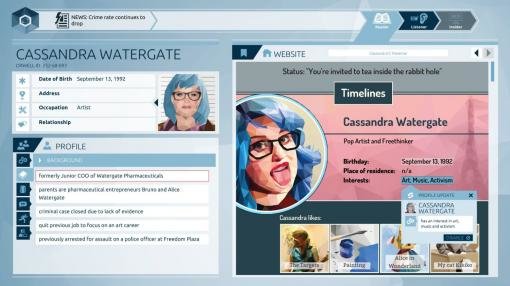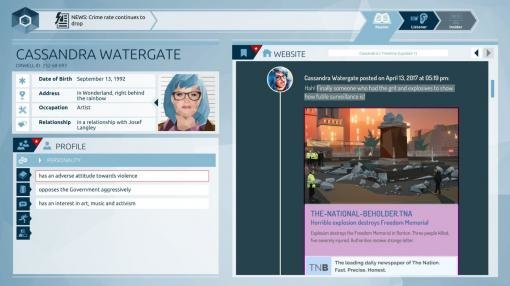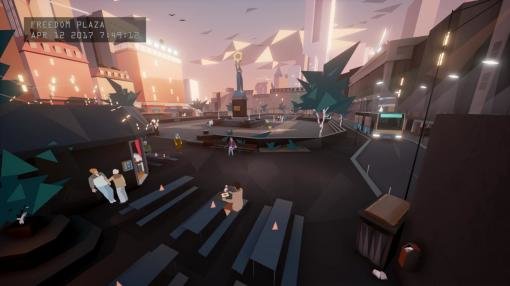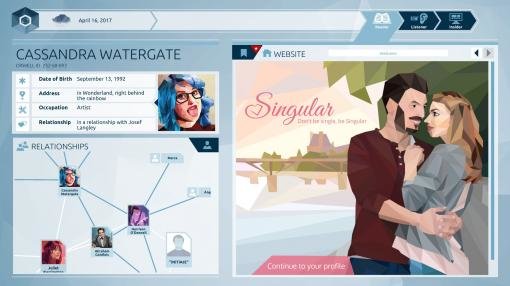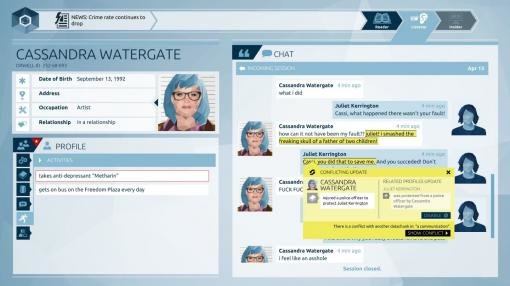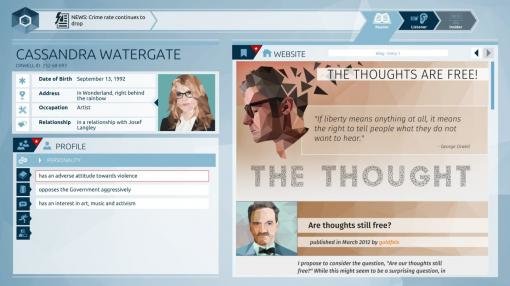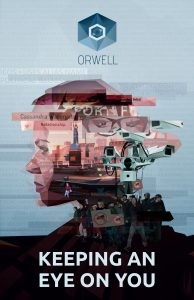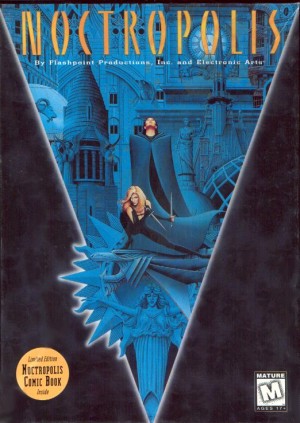Melanie Taylor - Orwell interview
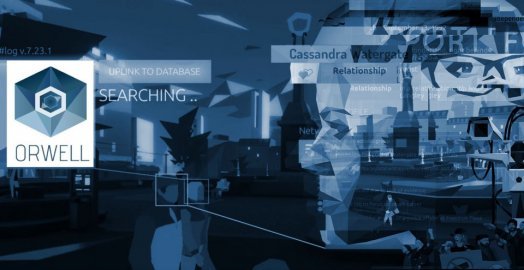
I was fortunate enough to see a variety of promising titles at this year’s gamescom. If I had to name my personal favorite, though, it would be a close race between Osmotic Studio’s surveillance thriller Orwell and Quantic Dream’s futuristic PS4 exclusive Detroit: Become Human. But while the latter is well-known and highly publicized, frankly I didn’t even know about the existence of Orwell until the first evening of gamescom. During a relaxed dinner, three colleagues from the German website Adventure Corner were raving about the game, so I decided to have a closer look myself. Two days later, I met Osmotic’s co-founder/artist Mel Taylor and Lex Suurland of Australian publisher Surprise Attack Games to get a personal glimpse at the studio’s debut title.
As I soon found out, virtually the entire game takes place within a fictional surveillance Operating System named Orwell. The invisible user of that OS – namely, the player – gets assigned by the government to find the perpetrator of a bomb attack that killed three people. Using various tools that Orwell has to offer, gamers will have the opportunity to research people who might be linked to the terrorist attack, and spy on their everyday lives in multiple ways. As we get to know our observation subjects in a very intimate way, tough choices await. Do we stay entirely loyal to our boss? Do we keep probing for secrets about characters who might want us to protect them from being incriminated?
As players decide which info ends up being permanently noted in the OS, there’s a strong responsibility on our shoulders, and when I played the highly immersive beginning of Orwell, I realized that few other titles had made me feel this uneasy about my actions before. Games have very different ways of challenging intellect, and Orwell takes a very different approach compared to traditional puzzle-based adventure design. If you appreciate games that soak you deep into their world, and make you ponder your decisions very carefully, I predict that you’re in for a real treat.
I won’t say more about what I experienced in the game’s first chapter, as it’s best to hear more about the game directly from the source. The following interview with Mel Taylor will provide a much more detailed idea of Orwell’s distinctive concept before the game’s scheduled Windows release, coming some time later this month.
Ingmar: Hi Mel, it’s a pleasure to meet you. Please introduce yourself for our readers, and tell us about Osmotic Studios.
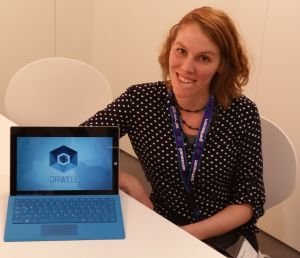 |
Osmotic Studios' Mel Taylor |
Melanie “Mel” Taylor: My name is Mel and I am the artist and one of the founders of Osmotic Studios. My co-founders are Daniel Marx, who works on game design and writing, and Michael Kluge who does the programming for Orwell. We are a young indie studio committed to making games with narrative and personal resonance that challenge players to reflect on the world around them. Orwell is our first game to be commercially released and we have been working on it for about two years.
Ingmar: Let’s talk about the unusual premise of Orwell, and how the game introduces it to players.
Mel: The intro sequence is seen through several surveillance cameras that show a busy plaza in the fictional city Bonton. During that scene, a bomb explodes, kills three people and destroys a monument. You, as the player, are assigned by the government to find out who’s responsible for the terror attack. The thing is, the game takes place within a fictional OS named Orwell. After the intro sequence, your boss Symes contacts you, introduces you to Orwell, and explains your assignment. Then he presents you with a fictional web browser which allows you to access a news website that contains an article about the explosion.
Very soon you have a main suspect who is the first person you’ll need to research. Let me explain: The security cameras at the plaza have scanned the faces of everyone who’s been around before and during the explosion. A blue-haired woman named Cassandra has drawn attention because of a previous entry on her police record. As Symes introduces you to the police database, you’ll find out more about her police record. This results in the player being able to fill in an Orwell profile about Cassandra.
Ingmar: How do we do that?
Mel: This is actually quite simple. The Orwell window is on the left side of the screen while other sources of information are on the right. Content from the right window can be added to Orwell via drag-and-drop. The more info you add, the more access you’ll receive to further documents. The Orwell system acts as a kind of keyword search engine, highlighting the most important information on the suspect by using former keywords you already put into the system. These keywords or text passages are named “datachunks”.
Ingmar: What does Cassandra’s police record tell us about her?
Mel: She participated in a protest march at the plaza in the past, and got accused of injuring a police officer during that event. Symes says it can hardly be a coincidence she’s gone to the same location again right before the bomb went off. After all, we know she’s a political activist who became conspicuous for violent behavior before. Since we put this particular info into Orwell, we are able to research further documents; for example, an article about the protest march. Now it’s up to you to dig deeper and find out more about Cassandra. I should add that you can’t just mechanically add content to Orwell as not everything you find is relevant, so you need to ponder the importance of information.
Ingmar: What can you tell me about the impact of player investigation?
Mel: In the beginning, Symes also explains why the government didn’t just come up with kind of a search engine where all the data is collected. There is an ethics codex behind Orwell; you as the researcher are the only person who is able to rate information, and add it to Orwell. Having said that, the degree of a character’s incrimination is based on your decisions. There is a strong human aspect to your work, so your task is not just about collecting data.
Ingmar: Does that mean I can put less effort into researching a character if I see no reason for it?
Mel: Yes, that’s possible. The events of the game are split up into several days. The first day is rather linear, and your influence is comparably linear as this day focuses on Cassandra.
Ingmar: Kind of a prologue to get used to the OS, I guess.
Mel: Right! On the second day, for instance, you can research three or four characters. How much effort you put into researching respective characters is up to you. As I indicated before, if you only add very little information to Orwell concerning a particular character, the less suspicious that person is (though this might not always be the case). During the course of the story, slightly different things can happen, based on how you depict people.
Ingmar: I imagine this could make players feel quite uneasy about some of their decisions.
Mel: We definitely have the ambition of making players feel uncomfortable about some aspects. Like, in the beginning when you start researching Cassandra, you might feel it’s likely she’s involved with the terror act. Yet, as you get to know characters better you realize they’re not always who they seemed to be at first glance. So, yeah, we certainly want players to question certain actions, and perhaps feel sorry about some of their decisions.
Ingmar: The people we observe become more than just a name in a database. That reminds me of the Academy Award-winning movie The Lives of Others.
Mel: (smiles) That’s an excellent comparison!
Ingmar: (smiles) A brilliant movie, by the way!
Mel: I agree completely, and I really like using The Lives of Others as a comparison. In that movie, the Stasi surveillance agent built up an emotional relation to the person he observed. We really hope players will feel a similar way when they play Orwell.
Ingmar: Actually, comprehending the mindset of the Stasi agent was one of the most fascinating thoughts behind The Lives of Others to me. I mean, he seemed unable to build up real-life relationships. At the same time, he indirectly witnessed every aspect of the other main character’s life. At some point he probably knew his observation subject better than he knew anyone else.
Mel: I’m very glad you came up with this particular film. The thing is, and you’ll see what I’m getting to, Orwell contains several surveillance tools. I have brought up the first one already, a fictional web browser called “reader”. It allows you, for example, to read articles and check out various online profiles. Amongst other things, we have a fictional Facebook where you can find out about characters’ self-projection on social media. There also is a job portal where people can upload their CVs. Of course, they try to leave a serious impression on such a platform, whereas you might get a different idea of them when you research people on a dating website.
The second tool is the “listener”, which allows you to observe different kinds of communications like phone calls or chat messages. Let’s say one person goes on social media and publicly states that she hates the government. However, you also read a private message she sent to her boyfriend telling him how shocked she was by the terror attack. This might be an indicator of the character’s ambivalence.
The third surveillance instrument is the “insider”. It enables you to directly access electronic devices like mobile phones or notebooks. You might find old photos, text documents, diaries, etc. This is really private stuff that perhaps no one else knows about. When you’re reading a diary, for instance, your perspective on the observed person might change drastically. So this is a very personal way of getting to know someone, and – just like in The Lives of the Others – the player is a rather passive observer who gets drawn in deeper and deeper.
Ingmar: You used the word ambivalence. The current question of how much privacy we’re willing to sacrifice is a complex issue that many people have ambivalent feelings about. The name Orwell makes me approach the OS with a rather negative connotation, and we talked about players feeling uncomfortable about some of their actions. At the same time, we’re trying to solve a terror attack that killed three human beings.
Mel: It is true that the name Orwell initially evokes negative associations, taking the author’s dystopian visions of total government control over people’s private lives and even thoughts. This is definitely intended, especially since most people associate the name Orwell with government surveillance. Despite this initial impression of a government-critical surveillance game, we do not want the player to feel like he is automatically the bad guy. The player’s superior Symes is definitely loyal to the government, but he feels like he is doing the right thing trying to prevent terror attacks and wants the player to feel likewise. The player himself gets to choose sides. Whether he follows Symes’ lead and primarily focuses on preventing attacks or whether he decides to prevent the people he spies on from being incriminated is entirely up to the player.
Ingmar: Does the whole game, aside from the intro sequence, take place within the actual OS?
Mel: Other than the intro sequence, the whole game does take place within the OS. You know, it’s a rather slow and quiet game. We really want players to think about what they’re doing. Whenever you’re adding info to Orwell, the OS tells you that “this cannot be undone.” Once the info is in the system, it stays there, so you need to think about what you’re doing.
That’s also why events usually aren’t time-based. There are a few scenes, though, where it’s important to make a decision before a certain event is over. For instance, there is this scene where two people talk to each other on the phone. During that conversation, your boss contacts you. He doesn’t know what they’re talking about, so he’s asking you. Now, what do you do? Do you decide to share your knowledge with Symes or not? Depending on your decision, the scene progresses in altering ways. So, events like that actually are time-based, but based on the in-game time.
Time in the game usually only goes by if the player performs interactions, which means that events only occur if the player interacts. But there are exceptions: dialogues between characters can sometimes be influenced indirectly by the player. So when a dialogue starts, in some cases the player will only have time until the end of the dialogue to perform certain actions – otherwise this will not be possible anymore and the time is up. I don’t want to spoil too much, but Orwell definitely contains some very tense scenes.
Ingmar: Please talk about the research that was necessary for the game and its OS.
Mel: We spent most of the research for the game looking at revelations from the Snowden leaks, documentaries about whistleblowers, and articles on the topic of surveillance and privacy, to get a glimpse of what was already in place and the ethical problems that arose from it. We didn’t look so much into how real surveillance systems worked technically because Orwell is not about technical details. It’s about problems that come with (partially automated) spying on people, and processing information into data bereft of context. So we shaped Orwell to look like a comfortable OS, a modern, easy-to-use application for the everyday user. For this we used social media interfaces like Facebook as guidelines, so the player would instantly know her way around.
Ingmar: To a degree some aspects of Orwell remind me of Sam Barlow’s Her Story. Do you consider that game an influence?
Mel: It was very fascinating for us to play Her Story! The thing is, by now we’ve been working on Orwell for two years, so the idea was born before Sam Barlow released Her Story. His game is quite different, actually, but the cool thing about it is the way the story is told. Players have to put the story fragments together themselves, and that’s super-exciting! In the beginning of the game, you don’t really know what’s going on, but you get more and more curious to find out. In this regard, it shares a certain similarity with Orwell indeed.
Orwell tells its story in a slightly more linear way though, since Her Story’s narrative is more fragmented by the nature of the game. Orwell does give players the freedom to do their own research in their preferred order to a certain degree and the players can also decide themselves how deep they want to dig and thus how much they want to know about certain story aspects. But it does guide the player to a certain degree – especially since it is divided into “game days” on which different events occur.
Ingmar: Orwell seems to contain a lot of text. How much of that text is voiced?
Mel: None. The game’s story is told mostly through text – in a similar manner to how we use operating systems in our everyday lives. The player will be further immersed through atmo music, sounds and short compositions that occur at dramatic events, but other than that, Orwell is a silent game.
Ingmar: Are you planning to release Orwell on other platforms besides Windows?
Mel: Not at the moment, as we’re focusing on the PC for now. Yet it’s possible there’ll be portings at some point of time. I think that, for instance, tablets are a very convenient platform for Orwell. But all of that really depends on the sales of the PC version.
Ingmar: When are you and your publisher, Surprise Attack Games, planning to release the game, and what kind of work is left to do?
Mel: The game will be released very shortly. We are very close to finishing the development and are very excited already to know the players’ reactions.
Ingmar: Thanks a lot for your time, Mel. Can you hint at what we can expect from Osmotic Studios in the future – after a hopefully successful release of Orwell?
Mel: Probably we will be concentrating on releasing Orwell for other platforms, such as Mac, Linux and mobile (tablet devices). We have no concrete plans for further projects yet, but no matter what, it is most certainly going to be something that is emotionally involving and pressing the borders of known game genres.


